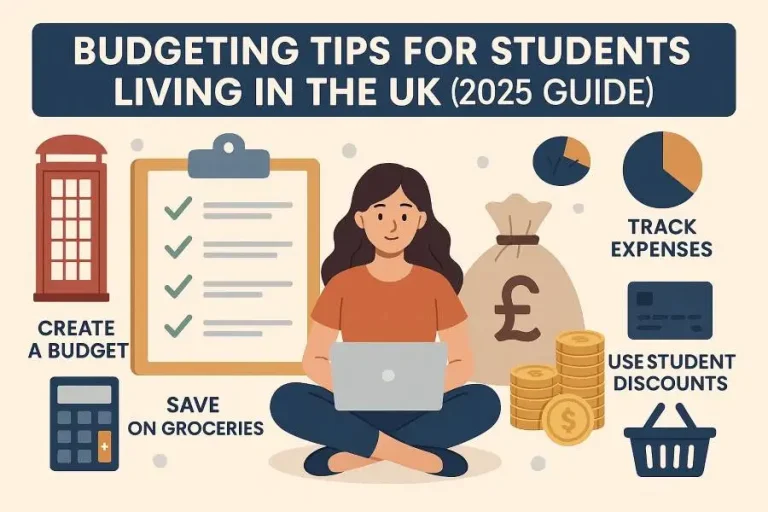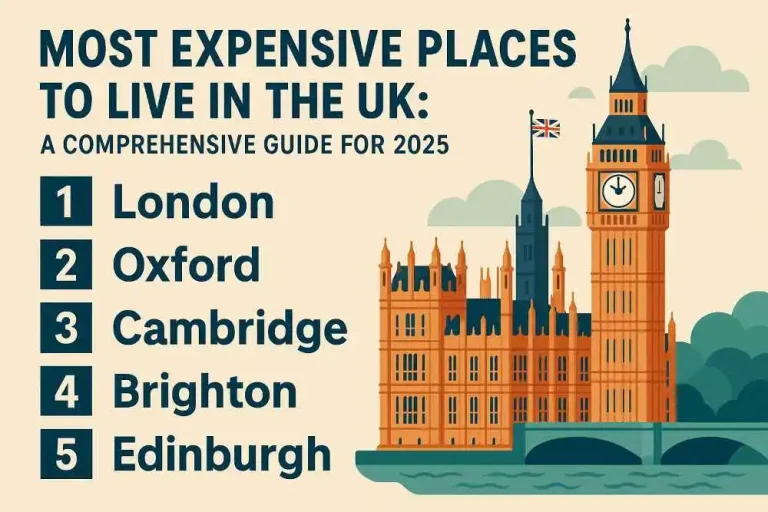Introduction
Studying in the UK is a life-changing experience. Whether you’re an international student embarking on a new journey or a local student navigating university life, one thing remains constant — student budgeting tips.
The UK offers world-class education, a rich cultural history, and an exciting lifestyle, but managing your finances wisely is crucial to enjoying all of it stress-free. From tuition fees and living expenses to that occasional pizza night with friends, every pound counts when you’re on a student budget.
This comprehensive guide will provide budgeting tips for international students in the UK, tools for smart financial management, and strategies to balance spending while making the most of your university experience.
Understand Your UK Expenses
Before setting a budget, understand what you’ll be spending on. Typical expenses include:
- Accommodation: Rent will likely be your biggest expense. Student housing can cost anywhere between £400–£900/month depending on the city.
- Utilities & Internet: May or may not be included in your rent. Expect to spend around £30–£60/month.
- Transportation: Budget £30–£70/month for travel (trains, buses, cycling).
- Food & Groceries: Approximately £100–£250/month depending on your habits.
- Mobile Plan: Roughly £10–£30/month.
- Study Materials: Books, software, printing — around £20–£50/month.
- Social Activities: Nights out, trips, events — budget at least £50/month.
- Healthcare & Insurance: International students may need to pay the Immigration Health Surcharge (IHS), and some opt for private insurance too.
Tip: Use a simple spreadsheet or budgeting app to list all fixed and variable costs with estimated values. It helps you stay realistic and plan accordingly.
Track Every Penny
The key to mastering student finance in the UK is tracking your income and expenses regularly. Tools to Use:
- Monzo or Starling (UK digital banks with great budgeting tools)
- Revolut (especially useful for international students)
- Budgeting apps like Yolt, Emma, or Snoop
- Excel or Google Sheets (customizable and offline)
Income Sources to Track:
- Student loans
- Parental allowance
- Part-time job income
- Scholarships/bursaries
Outgoings to Monitor:
- Rent
- Food
- Subscriptions (Spotify, Netflix, Amazon Prime)
- Gym memberships
- Coffee/snacks (trust me, these add up)
Get Smart About Student Finance
Understanding your financial support options is essential. UK Student Finance Sources:
- Maintenance loans (UK home students)
- University bursaries and hardship funds
- Scholarships for international students
- Graduate assistantships or teaching assistant roles
Pro Tip: Always check your university’s financial aid office for exclusive funding opportunities.
Cook More, Order Less
Food is one of the biggest controllable expenses. Budget-Friendly Eating Habits:
- Meal prep weekly to avoid mid-week takeaways.
- Shop at Aldi, Lidl, or ASDA instead of premium stores.
- Buy frozen fruits/veggies — they’re cheaper and last longer.
- Team up with flatmates for bulk cooking.
- Invest in a reusable water bottle and coffee cup.
Pro Tip: Use student cookbooks or free apps like “Tasty” for simple recipes under £5.
Use Every Student Discount You Can
Being a student in the UK gives you access to tons of student discounts. Must-Have Discount Tools:
- TOTUM Card (official student discount card)
- UNiDAYS (fashion, tech, fitness)
- Student Beans (offers and giveaways)
- 16-25 Railcard – save 1/3 on train fares
Pro Tip: Always ask “Do you have a student discount?” — even if it’s not advertised.
Budget for Fun
Life in the UK isn’t just about classes. Set aside money for travel, fun, and self-care. Budget Ideas for Enjoying Student Life:
- Local concerts or festivals
- Short trips to nearby cities (student coach/train tickets)
- Eating out once a week (budget £10–£20 max)
- Subscription to one streaming service
Strategy: Include “fun” as a category in your monthly budget. This reduces guilt spending and helps you enjoy your time.
Plan Ahead for Irregular Expenses
Some costs sneak up unexpectedly. Examples of Irregular or One-Time Costs:
- Visa renewal fees
- Plane tickets to go home
- Laptop or phone repairs
- Gifts for family or holidays
Solution: Create a “sinking fund” — save £10–£20/month just for such future expenses.
Get a Part-Time Job or Side Hustle
Working part-time is common and helps students cover living costs. Popular Student Jobs:
- Campus library or café assistant
- Teaching Assistant (TA)
- Tutor (especially for STEM or languages)
- Exam Invigilator
- Babysitting or pet-sitting
- Freelancing (graphic design, content writing)
Note: International students on Tier 4 visas can work up to 20 hours/week during term-time.
Avoid Debt Traps
Avoid borrowing unnecessarily or relying too much on credit cards or overdrafts. Tips to Avoid Financial Trouble:
- Pay off your credit card in full monthly.
- Don’t exceed your student overdraft limit.
- Avoid Buy Now, Pay Later (BNPL) schemes unless absolutely needed.
Make Use of University Services
Most UK universities offer:
- Free financial advice
- Job boards
- Hardship funding
- Budgeting workshops
- Mental health support if financial stress becomes overwhelming
Take Advantage of these resources — they’re included in your tuition fees!
Conclusion
Managing your budget as a student in the UK doesn’t mean giving up on fun or comfort — it means being intentional and smart about your money.
From cutting costs on food and travel to tracking your spending and planning ahead, these tips help you save money, reduce stress, and enjoy student life to the fullest.
Remember: Your student budget is a freedom plan, not a restriction. The sooner you learn to handle your finances, the more empowered you’ll feel — both now and in your future career.
FAQ
How much money should a student budget per month in the UK?
Typically, you should budget £800–£1,200/month, depending on location (London is more expensive).
Can international students get part-time jobs in the UK?
Yes, most international students can work up to 20 hours/week during term-time and full-time during vacations.
What is the cheapest way to travel as a student in the UK?
Buy a 16–25 Railcard, use student bus passes, and book travel in advance using apps like Trainline or National Express.
Are there scholarships for international students in the UK?
Yes! Check your university’s website and look for Commonwealth, Chevening, GREAT, and university-specific scholarships.
What’s the best bank account for students in the UK?
Digital banks like Monzo, Starling, or traditional banks like Santander (with student offers like free railcards) are good options.
Authored By
Goldie Gadpayale








